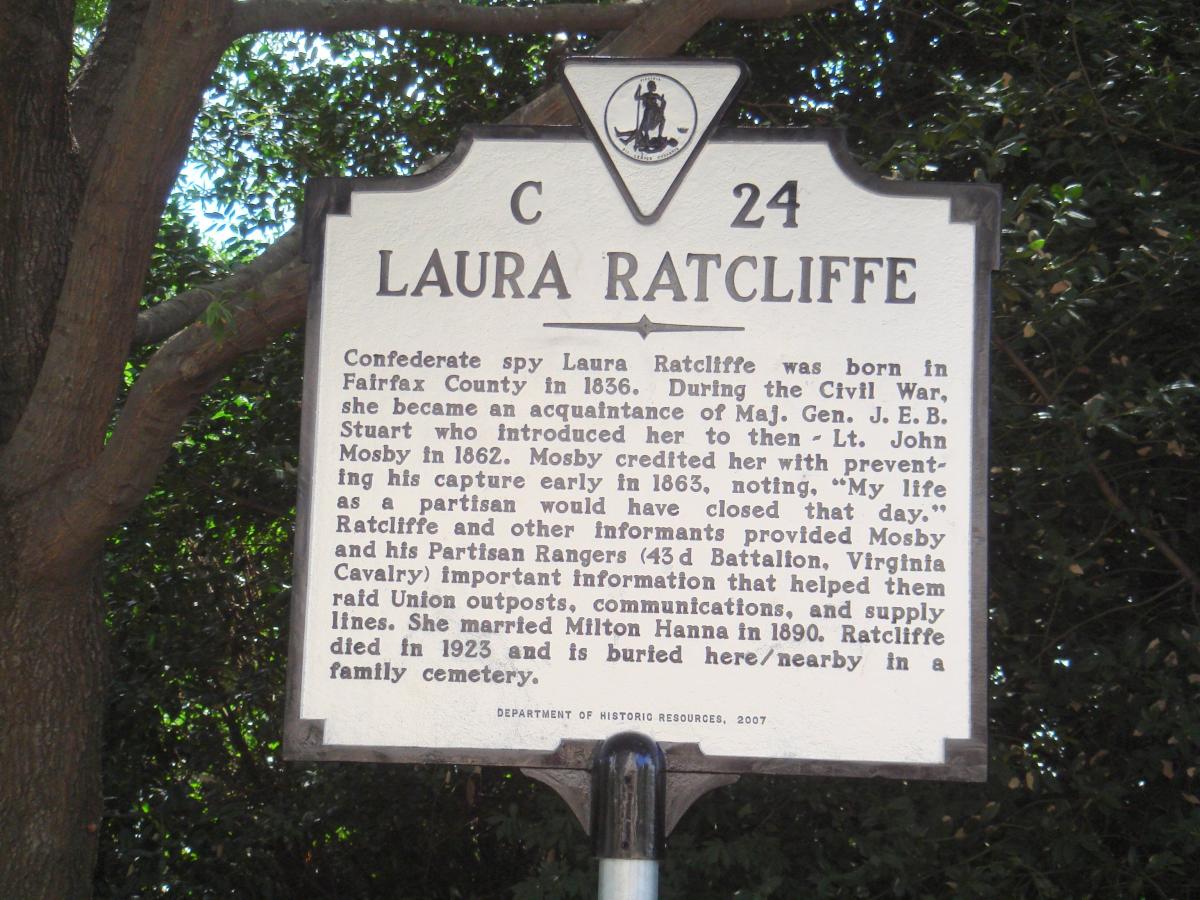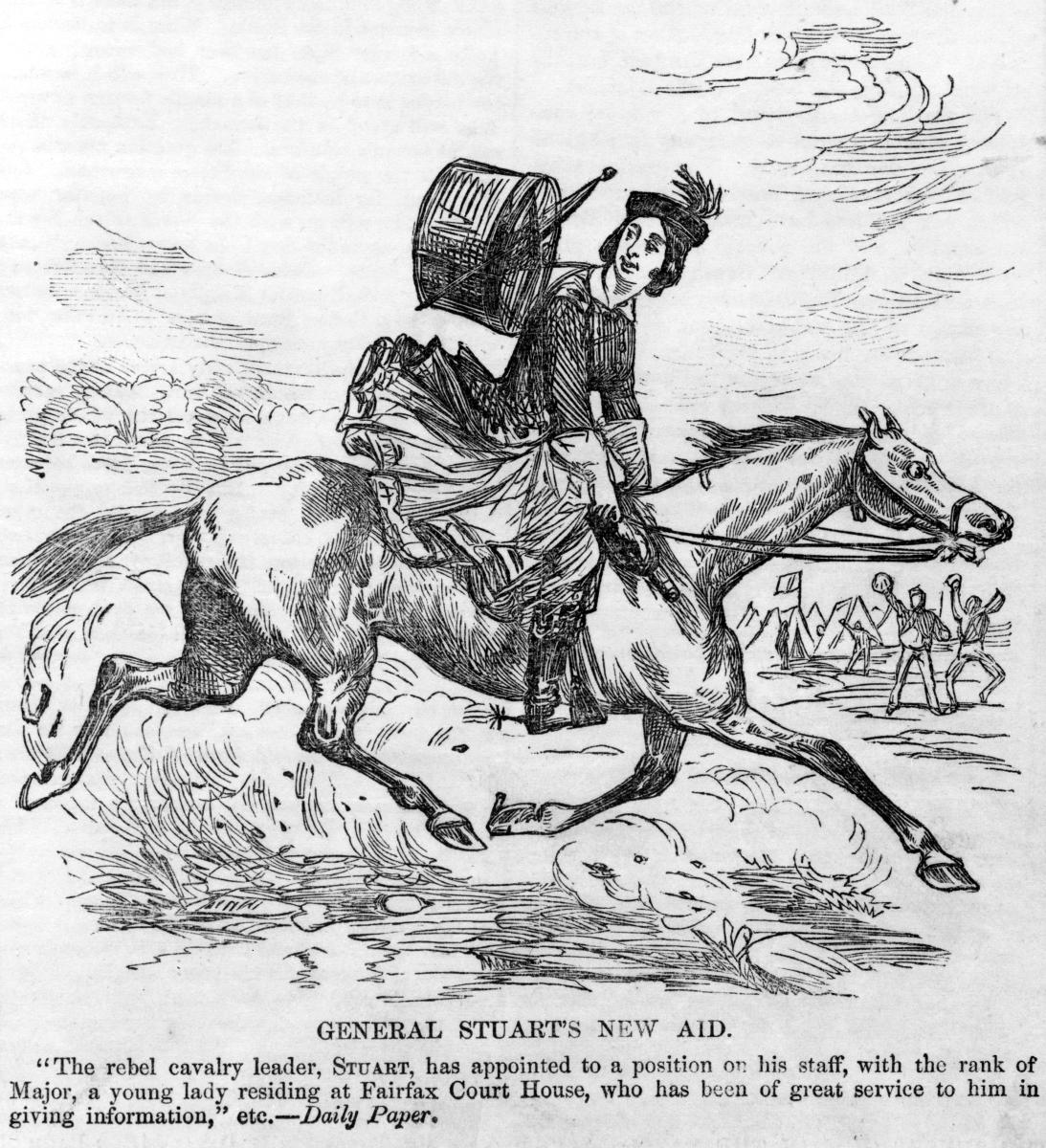Even in our darkest times, love is all around us. Civil War-era Northern Virginia illustrates many of these examples. During a time of great division, people helped each other. Soldiers were buoyed by the romantic letters they wrote home. Women took grave risks for love. Humanitarian efforts lifted hope.
You can see it throughout Fairfax County in stories both legendary and untold, both heartbreaking and triumphant. Chairs stood empty throughout the county as families from both sides tried to enjoy Christmases without their loved ones. Soldiers covered the walls of Historic Blenheim to let loved ones and fellow soldiers know they had been there. And slaves risked their lives to cross the river to beloved freedom at sites like Riverbend Park.
Here are several stories where love abided, even amidst war and conflict.
Romantic and patriotic love on the battlefield.
Letters were an important way to maintain a connection to peace in chaotic times.
Early in the Civil War, Union Major Sullivan Ballou was awaiting orders while stationed just outside Washington, DC. He believed he may die on his next assignment, so he wrote a beautiful letter to his 24-year-old wife, Sarah, just in case. He spoke of his love for her and for his country and how he was willing to die for the Union cause.
He never got a chance to mail the letter, though. He died one week later in a crushing Union defeat at the First Battle of Bull Run. Sarah never remarried and died at the age of 80. She is buried next to Sullivan in Providence, RI. Here is his letter.
July 14, 1861
Camp Clark, Washington DC
My very dear Sarah:
The indications are very strong that we shall move in a few days-perhaps tomorrow. Lest I should not be able to write again, I feel impelled to write a few lines that may fall under your eye when I shall be no more...
I have no misgivings about, or lack of confidence in the cause in which I am engaged, and my courage does not halt or falter. I know how strongly American Civilization now leans on the triumph of the Government and how great a debt we owe to those who went before us through the blood and sufferings of the Revolution. And I am willing-perfectly willing-to lay down all my joys in this life, to help maintain this Government, and to pay that debt...
Sarah my love for you is deathless, it seems to bind me with mighty cables that nothing but Omnipotence could break; and yet my love of Country comes over me like a strong wind and bears me unresistibly on with all these chains to the battle field.
The memories of the blissful moments I have spent with you come creeping over me, and I feel most gratified to God and to you that I have enjoyed them for so long. And hard it is for me to give them up and burn to ashes the hopes of future years, when, God willing, we might still have lived and loved together, and seen our sons grown up to honorable manhood, around us. I have, I know, but few and small claims upon Divine Providence, but something whispers to me-perhaps it is the wafted prayer of my little Edgar, that I shall return to my loved ones unharmed. If I do not my dear Sarah, never forget how much I love you, and when my last breath escapes me on the battle field, it will whisper your name. Forgive my many faults and the many pains I have caused you. How thoughtless and foolish I have often times been! How gladly would I wash out with my tears every little spot upon your happiness...
But, O Sarah! If the dead can come back to this earth and flit unseen around those they loved, I shall always be near you; in the gladdest days and in the darkest nights...always, always, and if there be a soft breeze upon your cheek, it shall be my breath, as the cool air fans your throbbing temple, it shall be my spirit passing by. Sarah do not mourn me dead; think I am gone and wait for thee, for we shall meet again...
As for my little boys -- they will grow up as I have done, and never know a father's love and care. Little Willie is too young to remember my long -- and my blue-eyed Edgar will keep my frolicks with him among the dim memories of childhood. Sarah, I have unlimited confidence in your maternal care and your development of their characters, and feel that God will bless you in your holy work.
Tell my two Mothers I call God's blessing upon them. O! Sarah I wait for you there; come to me and lead thither my children.
Sullivan
Forbidden love in Fairfax and Herndon.
 Courtesy HMDB.org / Photograph by J. J. Prats
Courtesy HMDB.org / Photograph by J. J. Prats
There are many things a young well-bred woman ought never to do. Not even for love. But apparently, spying isn’t one of them. As such, Fairfax County had two prominent female spies motivated by love and/or the attention of powerful men. Here are their stories.
Laura Ratcliffe from Herndon made the acquaintance of both Col. John S. Mosby and General JEB Stuart while serving as a nurse at Stuart’s camp. She provided valuable information to both of them during the war, and Stuart repaid her with an album in which he wrote four poems to her. It was inscribed, “Presented to Miss Laura Ratcliffe by her soldier-friend as a token of his high appreciation of her patriotism, admiration of her virtues, and pledge of his lasting esteem.”
In one instance, a Union Lieutenant came to the Ratcliffe home to buy milk. He knew of her connection to Mosby and said, “I know you would give Mosby any information in your possession, but as you have no horses and the mud is too deep for women folks to walk, you can’t tell him. So the next you hear of your ‘pet’ he will be either dead or our prisoner.” So Laura trudged through the drenching mud to warn Mosby. As a result, he evaded capture and lived to be a prominent thorn in the Union’s side throughout the war. Her grave is hidden within a hedge in front of the Washington Dulles Marriott Suites hotel.

In 1863, Antonia Ford lived across the street from Fairfax Courthouse. Her home was used as a boarding house for Union troops, and she would casually listen to their conversations and relay that intelligence to General Stuart and Colonel Mosby. She was imprisoned twice for spying. She ultimately fell in love with her jailer, Major Joseph C. Willard, who secured her release from prison. Willard was one of the owners of the Willard Hotel, an icon in Washington, DC. She is buried at Oak Hill Cemetery.
Humanitarian love on the line between north and south.

Northern Virginia’s proximity between the North and South during the crux of the Civil War became an area where partisans intermingled, free blacks lived, and help could be found if you were a slave fleeing the south.
Woodlawn Historic Site was once part of George Washington’s estate and it served as home to Washington’s step-granddaughter, Nelly Parke Custis. It sat just a few miles into Confederate territory. In 1846, a revolutionary thing happened there. Custis sold the property to Quakers who determined no slaves would work there. As a result, Woodlawn became an oasis of free, multiracial labor surrounded by plantations in an era focused on slave labor.
A few miles from Woodlawn, even closer to Union territory, the Quakers taught the free black community at Gum Springs how to monetize their skills and become independent. Between these two sites, enslaved blacks gained a blueprint for life after slavery.
When the Quakers moved from Woodlawn, they sold the property to a Baptist who kept up those practices during the Civil War.
Deeper into the county, another humanitarian story was taking place. Sully Historic Site in Chantilly was a stop on the Underground Railroad, helping enslaved blacks flee Confederate territory and find freedom across the river and state lines. You can learn more from the National Parks and local sites depicting the African American Experience.
As you can see, not even the darkness of war can dim love’s light. Love can be found in every shape and form in various aspects of life. What are your favorite stories of hope and love during times of trial? Share your stories on social using #FXVA and @VisitFairfax.





